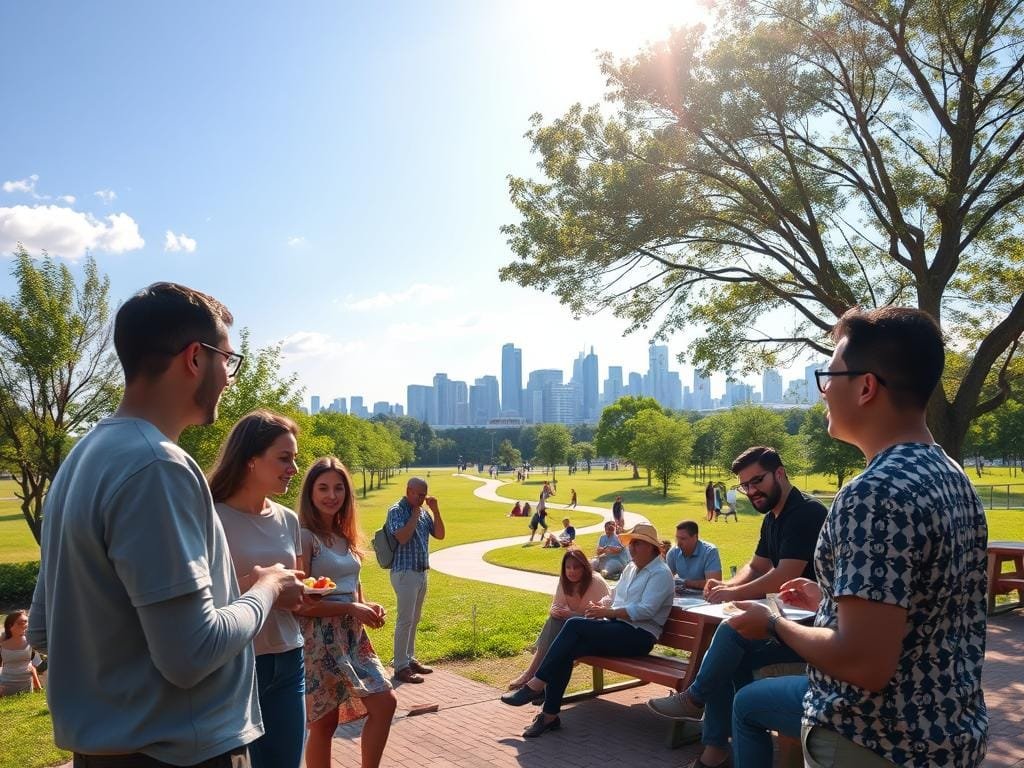Simple habits can greatly improve your well-being and help you live longer. A study from Johns Hopkins found that four smart behaviors can cut the risk of death by 80%. This shows how important it is to make good choices every day for a longer, healthier life.
By changing a few things in your daily life, you can live longer and feel better. This article will share the best ways to live a longer, healthier life with easy, lasting changes.
Table of Contents
Key Takeaways
- Simple habits can significantly impact your overall well-being.
- Adopting four smart behaviors can reduce the risk of death by 80%.
- Making informed choices promotes longevity and wellness.
- Small changes to your daily routine can enhance life expectancy.
- A healthier, more fulfilling life is achievable through sustainable changes.
The Science Behind Longevity
Exploring the science of longevity shows us how our daily choices affect our lifespan. Lifestyle, genetics, and environment all play a part in how long and healthy we live.
How Your Daily Choices Impact Life Expectancy
Studies reveal that daily habits like diet and exercise greatly influence our life span. Eating fruits, veggies, and whole grains boosts cell health. Regular exercise also lowers disease risk.
By choosing wisely, you can live longer. Avoid smoking, drink less alcohol, and use stress-reducing activities like meditation.
Lessons from the World’s Blue Zones
The Blue Zones are places where people live long and healthy lives. Researcher Dan Buettner found common lifestyle traits in these areas.
Key lessons from the Blue Zones include eating plants, staying active, and having strong social ties. Adding these habits to your life can boost your health and life span.
For more tips on starting a healthy lifestyle, check out this resource.
Nutrition Fundamentals for a Healthy Lifestyle and Longer Life
The food you eat greatly affects your health and how long you live. Eating well is key to a healthy life and living longer. By choosing the right foods, you can improve your health and maybe live longer.
The Mediterranean Diet Blueprint
The Mediterranean diet is known for its health benefits, including longer life. It’s full of fruits, veggies, whole grains, and healthy fats like olive oil. It also has some fish, poultry, and dairy, but less red meat and processed foods.
To follow a Mediterranean diet, eat more plant-based meals. Use olive oil for fats and eat fish and poultry in small amounts. This diet is good for your heart and helps you live longer and healthier.

Power-Packed Superfoods for Cellular Health
Some foods are great for keeping your cells healthy and helping you live longer. Leafy greens like spinach and kale are full of antioxidants. Berries are rich in vitamins and minerals. Nuts and seeds, like almonds and chia seeds, are also good for you.
Eating these superfoods can protect your cells, boost your immune system, and improve your health. Try to eat a variety of these foods to get the most benefits.
Strategic Eating Patterns: Fasting and Caloric Restriction
Fasting and eating less can be good for your health and longevity. These methods can improve your metabolism, reduce stress, and help your cells renew.
If you’re thinking about fasting or eating less, do it carefully. Talk to a doctor, even if you’re healthy. Start with short fasts or eat a bit less each day.
Physical Activity: The Movement Prescription
Making physical activity a part of your daily life is key to living longer and healthier. Studies show that regular exercise can add years to your life and lower the risk of serious diseases. This is backed by research published in the National Center for Biotechnology.
Designing Your Optimal Exercise Routine
Creating a good exercise plan starts with knowing your fitness goals and health status. It’s about mixing different exercises like cardio, strength training, and flexibility. A well-rounded routine boosts both physical and mental health.
Start with activities you like, as it makes sticking to your plan easier. Whether it’s walking, cycling, or swimming, the goal is to be consistent. Health guidelines suggest at least 150 minutes of moderate-intensity aerobic activity or 75 minutes of vigorous-intensity aerobic activity each week.
Strength Training at Any Age
Strength training is essential for any exercise plan, benefiting people of all ages. It builds muscle, strengthens bones, and boosts metabolism. For older adults, it can help prevent falls and fractures.
- Start with light weights and higher repetitions to build endurance.
- Gradually increase the weight or resistance to keep challenging your muscles.
- Choose exercises that work multiple muscle groups at once.
Mobility Practices for Injury Prevention
Mobility exercises are vital for keeping flexible and preventing injuries. They prepare your muscles and joints for exercise, lowering the chance of strains and sprains. Adding mobility practices to your routine can also boost your performance in other exercises.
Examples of mobility exercises include dynamic stretches, yoga, and Pilates. These activities improve flexibility, posture, and balance. By focusing on mobility, you can enjoy a more active life with fewer injuries.
Sleep Optimization for Extended Vitality
Getting good sleep is key to living longer and feeling better. Sleep is more than just rest; it’s vital for your health and life quality.

The Science of Sleep and Aging
Studies show sleep is important for keeping cells working right and staying healthy. As we get older, better sleep helps us live longer. “Sleep is the golden chain that ties health and our bodies together,” Thomas Dekker said. Good sleep is a must for healthy aging.
While we sleep, our bodies fix damaged cells, build bones and muscles, and boost our immune system. Bad sleep can cause heart disease, diabetes, and obesity, all of which shorten our lives.
Creating Your Ideal Sleep Sanctuary
Turning your bedroom into a sleep haven can make a big difference. It’s about making a space that helps you sleep well. Here are some wellness tips:
- Make sure your bedroom is dark, quiet, and comfy.
- Get a good mattress and pillows.
- Keep TVs and computers out of your bedroom.
By changing your bedroom, you can improve your sleep and boost your health and energy.
Natural Sleep Enhancement Strategies
If you’re having trouble sleeping, try natural ways to help. Stick to a sleep schedule, use relaxation methods like meditation, and avoid caffeine and big meals before bed. Look into natural sleep tips to find what works for you.
Adding these habits to your day can make your sleep better. This helps you live longer and feel better overall.
Stress Management: Your Mental Longevity Toolkit
Managing stress is key to keeping your mind sharp and healthy. Too much stress can harm your health, leading to chronic diseases. By adding stress-reducing activities to your day, you can live a better life.
Understanding Chronic Stress and Its Aging Effects
Chronic stress affects your body and mind deeply. It triggers a “fight or flight” response, releasing stress hormones. Long-term stress can cause aging effects like inflammation and cellular damage.

Daily Mindfulness and Meditation Practices
Mindfulness and meditation are great for managing stress. They help you stay present, reducing worries about the past or future. These practices lower stress hormones, boost mood, and improve thinking skills. Start with simple exercises like:
- Deep breathing exercises
- Body scan meditation
- Mindful walking
For more tips on staying healthy, including managing stress, visit Boost Healthy Life.
Nature Immersion for Stress Reduction
Being in nature is also a great stress reliever. Nature lowers stress hormones, improves mood, and helps with anxiety and depression. You can enjoy nature by:
- Taking a walk in a nearby park
- Gardening or tending to plants
- Simply spending time outdoors, away from screens and urban noise
By using these stress management techniques and other healthy habits, you can improve your mental health and well-being.
Social Wellness: The Relationship Factor
Building strong social connections is key to a healthy life and longer years. By nurturing relationships and creating a support network, you boost your mental and physical health.
Building Your Longevity Support Network
A strong support network helps you face life’s ups and downs. It includes family, friends, workmates, and community members. Studies show people with good social ties have better health, lower blood pressure, and less depression (Source).
To grow your support network, try these tips:
- Join in community activities that interest you.
- Volunteer for things you care about.
- Stay in touch with loved ones regularly.
- Find clubs or groups that share your hobbies.
Meaningful Connection in a Digital World
In today’s world, it’s easy to forget the value of real-life connections. While social media keeps us in touch, face-to-face interactions are vital.
Here are ways to make meaningful connections:
- Plan regular meetups with friends and family.
- Take part in group activities that encourage socializing.
- Listen actively when talking to others.
Volunteering and Purpose as Longevity Enhancers
Volunteering helps your community and boosts your sense of purpose. This can lead to a longer, healthier life.
“Volunteering is a powerful way to foster social connections, build a sense of purpose, and promote overall well-being.”
Volunteering offers many benefits, as shown in the table below:
| Benefits | Description | Impact on Longevity |
|---|---|---|
| Social Connection | Volunteering helps you meet new people and build relationships. | Reduces feelings of loneliness and isolation. |
| Sense of Purpose | Engaging in meaningful activities gives you a sense of direction. | Enhances mental well-being and motivation. |
| Physical Health | Some volunteering activities involve physical activity. | Contributes to overall physical health and mobility. |

By focusing on social wellness and building strong relationships, you’re on the path to a longer, healthier life. It’s the quality of your connections that counts, not just how many you have.
Preventive Healthcare: Your Proactive Approach
By taking control of your health, you can live a more vibrant life. Being proactive helps lower the risk of chronic diseases. It also boosts your overall well-being.
Preventive healthcare is about keeping yourself healthy. It means staying informed, making healthy choices, and working with your doctor.
Age-Appropriate Screening Guidelines
Regular health screenings are key to preventive healthcare. They catch health problems early, when they’re easier to treat. The screenings you need depend on your age, gender, and health risks.
- For Adults Under 40: Focus on screenings for blood pressure, cholesterol levels, and certain cancers like breast and cervical cancer.
- For Adults 40-64: In addition to the above, consider screenings for colon cancer, diabetes, and osteoporosis.
- For Adults 65 and Older: Continue with the previous screenings and add checks for cognitive function, vision, and hearing.
Building an Effective Healthcare Partnership
Having a strong partnership with your healthcare provider is essential. It means sharing your health concerns, asking questions, and following treatment plans.
To build this partnership, consider the following:
- Keep a record of your medical history and any changes in your health.
- Prepare a list of questions before your appointments.
- Understand your diagnosis and treatment options.
Supplement Strategies: What Works and What Doesn’t
A balanced diet is key, but some supplements can help too. It’s important to know what works and what doesn’t.
Some supplements that have shown promise include:
- Omega-3 fatty acids for heart health.
- Vitamin D for bone health and immune function.
- Probiotics for gut health.
Always talk to your healthcare provider before taking any supplements. They can interact with medications or have side effects.
Brain Health: Cognitive Strategies for Longevity
You can greatly improve your brain health and live longer by making smart choices. As we get older, our brains change, which can slow us down. But, by doing certain things every day, you can keep your brain sharp and maybe even slow down aging.
Mental Exercise Routines for Neural Plasticity
Doing things that challenge your mind is key to keeping your brain flexible. This means:
- Puzzles and brain games
- Learning a new skill or hobby
- Reading and talking about interesting topics
Studies show that brain training can make older adults smarter. Try activities that make your brain work hard and stay flexible.
Brain-Boosting Nutrition Protocol
What you eat is very important for your brain. Eating foods that are good for your brain can help you think better and stay sharp. Foods that are great for your brain include:
| Nutrient | Food Sources | Benefits |
|---|---|---|
| Omega-3 Fatty Acids | Fatty fish, nuts, and seeds | Supports brain cell structure and function |
| Antioxidants | Berries, leafy greens, and other fruits and vegetables | Protects against oxidative stress and inflammation |
| B Vitamins | Whole grains, lean meats, and leafy greens | Essential for energy production and cognitive function |
For more tips on taking care of yourself, including what to eat, visit How to Build a Sustainable Self-Care Routine at.
Physical Movement for Mental Sharpness
Exercise is good for your body and brain. It makes you think better and stay sharp. You can do this by:
- Aerobic exercises like walking, running, or cycling
- Resistance training to build strength
- Flexibility and balance exercises like yoga or tai chi
Adding exercise to your daily life helps your body and mind. It’s a big step towards living longer and feeling better.
Environmental Wellness: Creating Longevity Spaces
Environmental wellness is key to a healthy life. It’s important to have a living space that supports your well-being. The environment you live in greatly affects your health and how long you live.
Minimizing Toxin Exposure in Daily Life
To avoid toxins, be careful about the products you use every day. Choose personal care items, cleaning supplies, and building materials without harsh chemicals. For example, use natural cleaning products or make your own with baking soda and vinegar.
Also, reduce air pollution in your home. Use air purifiers in key areas like bedrooms and living rooms. Don’t forget to change the filters in your heating and cooling systems to keep the air clean.
Designing a Health-Promoting Living Environment
To create a healthy living space, focus on relaxation and physical activity. Start by decluttering and organizing your home to feel calm and peaceful.
Add elements of nature like plants, natural light, and views to improve your mood. Use a desk near a window to get more natural light.
Tips for a Health-Promoting Home:
- Use non-toxic paints and finishes
- Incorporate plants known to purify the air
- Maximize natural light
- Create a peaceful and clutter-free environment
Clean Water and Air: Practical Solutions
Clean water and air are vital for health and longevity. For clean drinking water, install a water filtration system. Make sure to check and maintain it regularly.
To keep the air clean, use air purifiers and open windows for fresh air. This is very important in areas with bad air quality.
Practical Tips for Clean Air and Water:
- Install a water filtration system
- Use air purifiers in key areas of your home
- Regularly ventilate your home
- Maintain your air conditioning and heating systems
By following these tips, you can improve your environmental wellness. This reduces toxin exposure and creates a healthier living space. It supports your overall well-being and longevity.
Conclusion: Your Personalized Longevity Blueprint
By using the strategies from this article, you can make a plan for a long life. This plan should focus on healthy habits and wellness. It’s key to live a long and healthy life.
A longevity blueprint should include eating well, staying active, managing stress, and getting enough sleep. These choices can greatly improve your health and slow aging.
Living a healthy lifestyle and adding wellness habits to your day can help you live longer. Start making your own longevity plan today. See how it can make your life longer and healthier.
